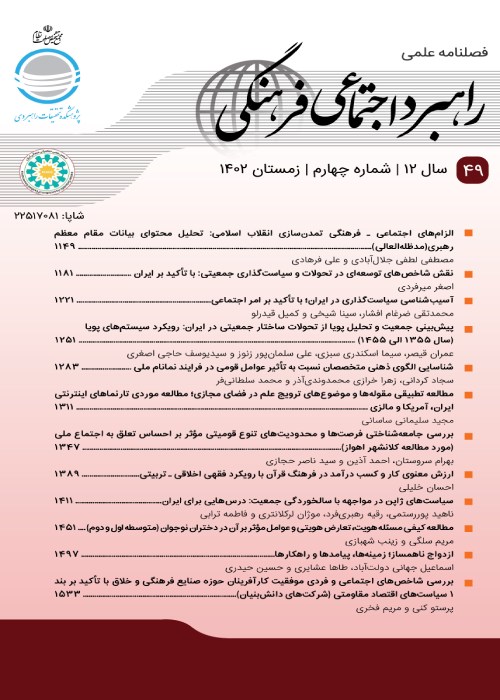A Grounded Theory for Innovation in Iran's Electronic Public Services
Author(s):
Article Type:
Research/Original Article (دارای رتبه معتبر)
Abstract:
By entering the digital era and given the expansion of electronic devices, the demands and needs of society have undergone changes and the government should adapt public services with these changes and provide new services with an innovative approach using modern information and communication technologies. This qualitative research seeks to model the innovation process of electronic public services in Iran using Strauss and Corbin's approach to the Grounded Theory. In this regard, due to the lack of a codified model in the field of innovation in e-government citizen services, based on national studies and experiences, 15 specialized semi-structured interviews with scientific and executive experts were conducted to answer the research question. The analysis of data in the open coding process led to the emergence of 165 abstract concepts in the form of 22 main categories. Then, these categories were linked together in the pivotal coding process. Finally, five theorems were obtained as a result of selective coding. Data analysis, based on Grounded Theory, suggests that "Unfulfilled Expectations of Citizens" and "New Expectations of Citizens" and "Technological Possibilities" considered as the Innovation Opportunity Making Streams, through the Innovation Process Cycle consisting stages of "Need to Service Discovery", "Service Design", "Provision of the Service" and "Re-continuation of the Innovation Process in Service" transform the "Innovation Niche" into the quadruple effects of "Innovative Citizen Services", "Service Experience", "Public Services Productivity" and Government Agility. At the same time, the Enabling Factors of "Participatory Approach", "Supportive Attitude", "Organizational Innovation Capacity", "Technology Social Equipment", Providing Legal Foundation, e-Trust Infrastructure, "Organizational System" and "Entrepreneur Agent" are considered as interfering factors and the underlying factors of "Close Context" and "Far Context" as enabling contextual factors, facilitating innovation in e-government citizen services.
Keywords:
public services , innovation , e , government , e , services , grounded theory
Language:
Persian
Published:
فصلنامه راهبرد اجتماعی فرهنگی, Volume:7 Issue: 26, 2018
Page:
87
magiran.com/p1877192
دانلود و مطالعه متن این مقاله با یکی از روشهای زیر امکان پذیر است:
اشتراک شخصی
با عضویت و پرداخت آنلاین حق اشتراک یکساله به مبلغ 1,390,000ريال میتوانید 70 عنوان مطلب دانلود کنید!
اشتراک سازمانی
به کتابخانه دانشگاه یا محل کار خود پیشنهاد کنید تا اشتراک سازمانی این پایگاه را برای دسترسی نامحدود همه کاربران به متن مطالب تهیه نمایند!
توجه!
- حق عضویت دریافتی صرف حمایت از نشریات عضو و نگهداری، تکمیل و توسعه مگیران میشود.
- پرداخت حق اشتراک و دانلود مقالات اجازه بازنشر آن در سایر رسانههای چاپی و دیجیتال را به کاربر نمیدهد.
In order to view content subscription is required
Personal subscription
Subscribe magiran.com for 70 € euros via PayPal and download 70 articles during a year.
Organization subscription
Please contact us to subscribe your university or library for unlimited access!




